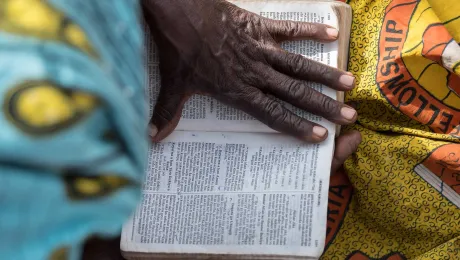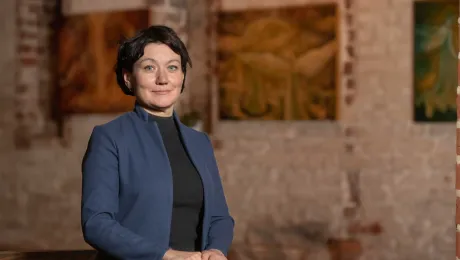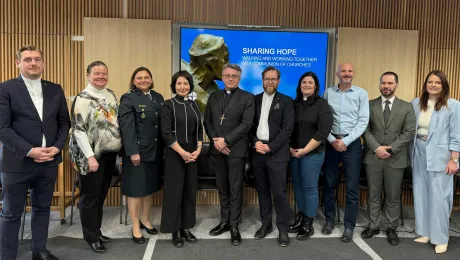LWF general secretary Rev. Dr Anne Burghardt joins leaders of 14 Indonesian Lutheran churches in Tarutung, Sumatra. Gathered by the LWF National Committee for Indonesia, the meeting helped reinforce communion ties, discuss global and local challenges, and explore the dynamic interplay of faith and action in a diverse Indonesian context.
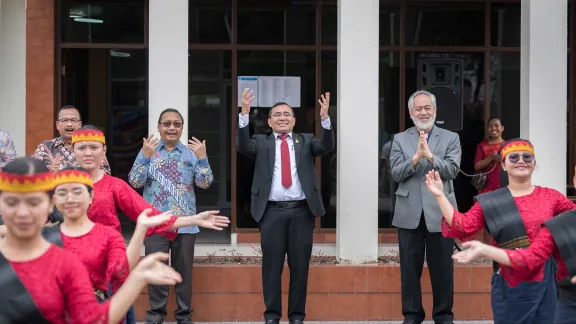
Representatives of LWF member churches in Indonesia offer their welcome to general secretary Rev. Dr Anne Burghardt as she arrives at the Protestant Christian Batak Church (HKBP) in Tarutung. Photo: LWF/Albin Hillert
LWF general secretary meets church leaders in Sumatra
(LWI) - Bringing together 14 Lutheran churches, a church leaders meeting held in Tarutung, Sumatra, on 23 November served to nurture and strengthen relations between the Lutheran World Federation (LWF) member churches in Indonesia.
Held during a member church visit by LWF general secretary Rev. Dr Anne Burghardt, the meeting was convened by the LWF National Committee for Indonesia (KN-LWF) – a body that supports coordination among churches today representing more than 8.6 million Lutherans in the country.
“This is a day to deepen communion relationships both within Indonesia and globally,” reflected Rev. Dr Philip Lok, LWF regional secretary for Asia. “And also, to continue the good conversations started at the recent LWF Assembly in Krakow, Poland, on questions of unity, spirituality and hope in a world burdened by conflicts and war.”
For general secretary Burghardt, the day was an opportunity to learn and reflect together on the unique gifts and challenges of the different member churches.
“The LWF is about bringing local and global together.” Burghardt said as she spoke on the day. “Only this way, we can see how best to serve the Lord and turn our faith into action.”
In a greeting after morning devotion in the chapel of the HKBP head office, Burghardt mentioned the importance of upholding unity in reconciled diversity, a principle that guides the LWF Communion but also has a special meaning in a secular Indonesian context where it is reflected in the state ideology called Pancasila. “There is a lot to learn from our Indonesian member churches who are witnessing in a minority situation in a predominantly Muslim country,” she said.
During the church leaders’ meeting that followed, Burghardt recalled the four founding pillars of the LWF – theology, mission, search for Christian unity and service to the needy – and said “our task is to see how we ‘translate’ these four pillars into the life and ministry of our churches today.”
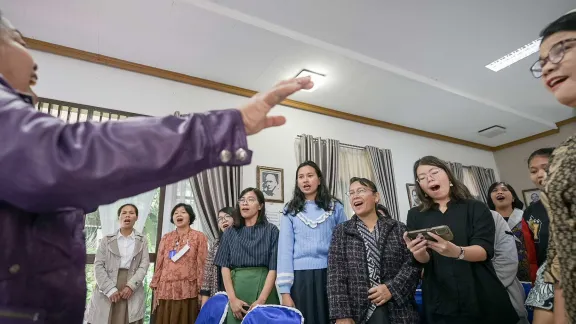
Choir members sing during morning worship in the chapel of the HKBP head office in Tarutung. Photo: LWF/Albin Hillert
Bishop Dr Robinson Butarbutar, Ephorus of the Protestant Christian Batak Church (HKBP) and chairperson of the KN-LWF, reflected on the importance of gathering as churches in Indonesia together with LWF general secretary.
Recalling a visit by the then-LWF general secretary Ishmael Noko in 1999 – which helped lay the foundations for the formation of KN-LWF in the year 2,000 – Butarbutar observed the effect of that visit as bringing churches in Indonesia closer than they had been before, and said he hopes the present visit of general secretary Burghardt may have a similar effect. He also expressed his hope that this visit will strengthen women’s leadership in Lutheran churches in Indonesia.
Butarbutar noted that the work of the National Committee has been strengthened in recent years, and took stock of the global dimension of Lutheran interchurch relations today.
“When you know that 150 member churches all around the world are praying together, and praying for you, you are strengthened, energized and you are given hope. And you rejoice, knowing that you are not alone,” Butarbutar said.
Strengthening Lutheran identity is a priority for Indonesian churches
“For the churches in Indonesia, we see as a key priority in the years ahead the question of how to strengthen a shared Lutheran identity,” said KN-LWF director Rev. Dedi Pardosi. “This is not to say we strive for uniformity, but a stronger sense of shared identity.”
Additional priorities for the churches include capacity-building on gender justice and inclusivity both within the churches and society at large, Pardosi explained.
“But also, climate change and disaster preparedness. Our communities are affected every year by disasters – floods, landslides, earthquakes – so we are working together now to strengthen our capacity for crisis response,” he added.
For Rev. Mika Purba, head of the Ecumenical Bureau of HKBP, a key focus ahead is to explore possibilities for joint concrete action among the Indonesian member churches, to give the best possible service and ministry to the communities they serve.
“We are different churches, yes, but we share the same problems, for example in relation to the environment,” Purba observed. “How can we solve these problems together and use our voices to speak up publicly to call for solutions to these issues?” she asked.
“As Christians in Indonesia we are in minority, but we want to show that we are together, to give hope to future generations,” Purba concluded.
Rev. Dr Humala Lumbantobing, general secretary of the Christian Protestant Church in Indonesia (GKPI) – a church of some 268,000 members across 1,126 parishes – reflected that Burghardt’s contribution to the conversation was significant.
“It is important to hear about global issues in relation to our work as local churches and see how we can all work to realize the vision and mission of the LWF,” he said.
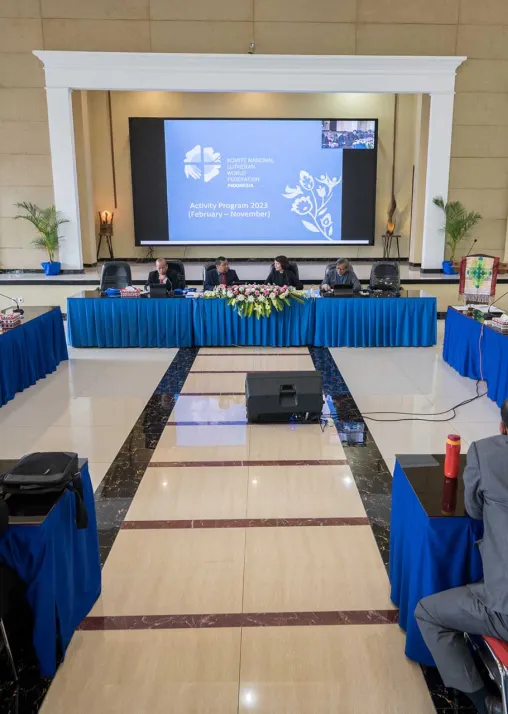
Bishop Dr Robinson Butarbutar shares words of introduction at the church leaders meeting. Photo: LWF/Albin Hillert
Encouragement for upcoming ecumenical year
The church leaders’ meeting coincided with a cultural evening hosted by HKBP at the church’s main office, bringing together more than 1,000 congregants from Tarutung and the surrounding area in prayer at the adjacent Pearaja church.
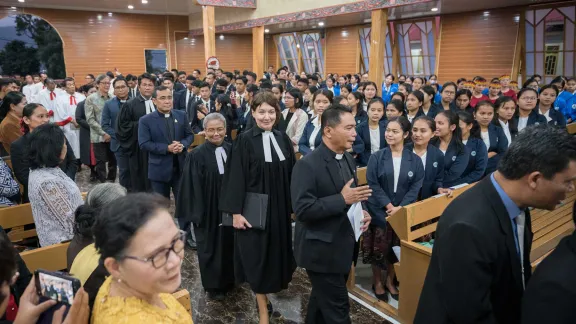
23 November 2023, Tarutung, Indonesia: Lutheran World Federation general secretary Rev. Dr Anne Burghardt enters as part of the procession as an ecumenical prayer service is celebrated at the Pearaja church of the Protestant Christian Batak Church (HKBP) gathering some 1,000 people from various congregations and attended by church leaders from 14 different Lutheran churches in Indonesia. Photo: LWF/Albin Hillert
General secretary Burghardt, invited to offer a reflection on the theme of HKBP’s upcoming ‘Inclusive Ecumenical Year’ – held under the theme of “Presenting God’s goodness to all (Matthew 5:45)” – noted that this “is a missionary theme. It calls us to be true disciples of our Lord Jesus Christ, to live out the gifts of the Holy Spirit: love, joy, peace, patience, kindness, generosity, faithfulness, gentleness, and self-control (Galatians 5:22) to give good witness of our faith,” Burghardt said.
“How can churches, how can we as LWF, as a worldwide communion of Lutheran churches, present God’s goodness to all? What does it mean in practice?” she asked, urging a holistic approach to the life and ministry of the Church.
“For presenting God’s goodness to all, all aspects of holistic mission need to be involved: proclamation, worship, advocacy, and diakonia. They all need to include the understanding that God wants us to contribute to making the new creation more visible in the world, reconciling all things in Jesus Christ,” she said. “This includes standing up for human dignity; promoting respectful and mutually supportive relationships between women and men where both are given equal opportunities; care for creation and raising the voice for the oppressed.”
